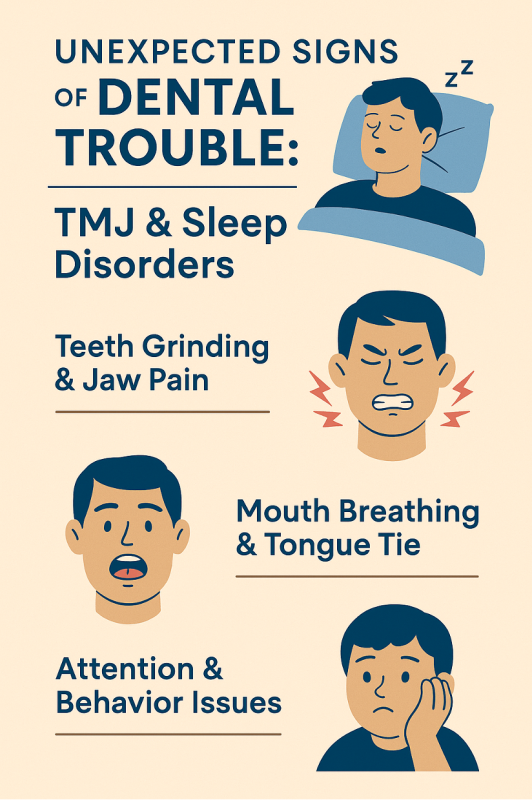When you visit the dentist, you’re probably thinking about cavities, cleanings, and maybe the occasional lecture about flossing. But your dentist might be one of the first professionals to notice signs of something much deeper—literally.
Many patients are surprised to learn that dental exams can reveal early indicators of sleep disorders, TMJ dysfunction, and even sinus-related problems. These issues may be overlooked by general practitioners, but your mouth tells a story your dentist is trained to read.
The Nighttime Clues: Sleep & Jaw Strain
Grinding your teeth at night, waking up with headaches, or feeling constantly tired despite a full night’s rest? These could be signs of sleep-disordered breathing or bruxism (tooth grinding). Dentists often spot wear patterns on your teeth and tension in your jaw muscles that point to these issues before you ever connect the dots.
This is especially true for children. Kids with undiagnosed sleep disorders may grind their teeth or breathe through their mouths at night. A child who struggles with attention, hyperactivity, or behavioral issues may actually be battling poor-quality sleep due to an underlying airway concern—something a dentist might observe based on jaw development, tongue posture, and signs of chronic mouth breathing.

An exam at the dentist may reveal more than just cavities.
TMJ Dysfunction: It’s More Common Than You Think
Many patients live with jaw discomfort, clicking sounds, or facial tension without realizing it’s part of a broader issue. A dentist trained in evaluating jaw alignment and function might notice symptoms of TMJ dysfunction during a routine check. Chronic tension or pain in the jaw muscles, asymmetry in bite alignment, or even how wide you can comfortably open your mouth—these are subtle signs that can point toward a problem.
In children, early signs of TMJ problems can appear as difficulty chewing, frequent complaints about jaw pain, or avoidance of chewy foods. Catching these signs early can help prevent worsening pain and development challenges.

TMJ pain and jaw tension are often noticed during dental visits.
Sinus Health and the Mouth Connection
Sometimes, what feels like a dental issue—pressure in the upper teeth or jaw—can actually stem from sinus inflammation. Because the roots of your upper teeth sit close to your sinus cavities, discomfort in one often affects the other. Dentists trained to evaluate this connection can help determine whether sinus health may be impacting your overall comfort.
The Big Picture
Dentists are uniquely positioned to spot these less-obvious health concerns because of their up-close look at your oral structures, facial muscles, and airway alignment. If something’s off, they may recommend further evaluation or refer you to the appropriate specialist—whether that’s a sleep physician, ENT, or orthodontist.
The next time you’re in for a cleaning, remember—your dentist isn’t just checking for plaque. They might be the first to notice the signs that can transform your quality of life. If you are in the Milwaukie Or area, find a good family dentist and book an exam.
And yes, they’ll still ask if you’ve been flossing.
Infographic: Signs of hidden issues your dentist can detect.
